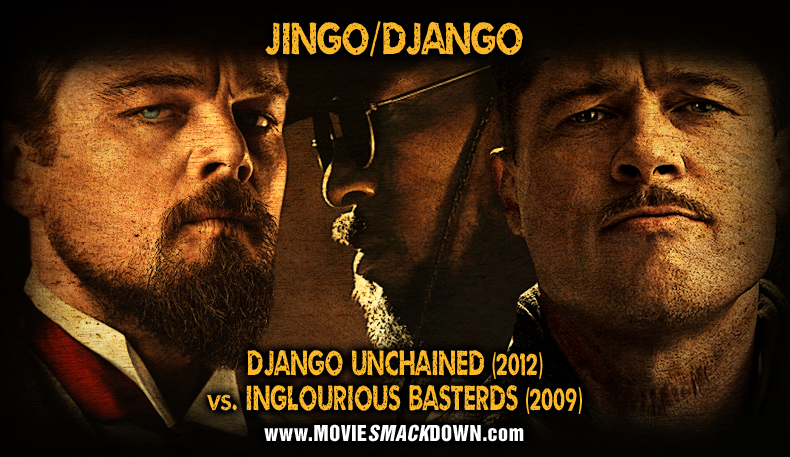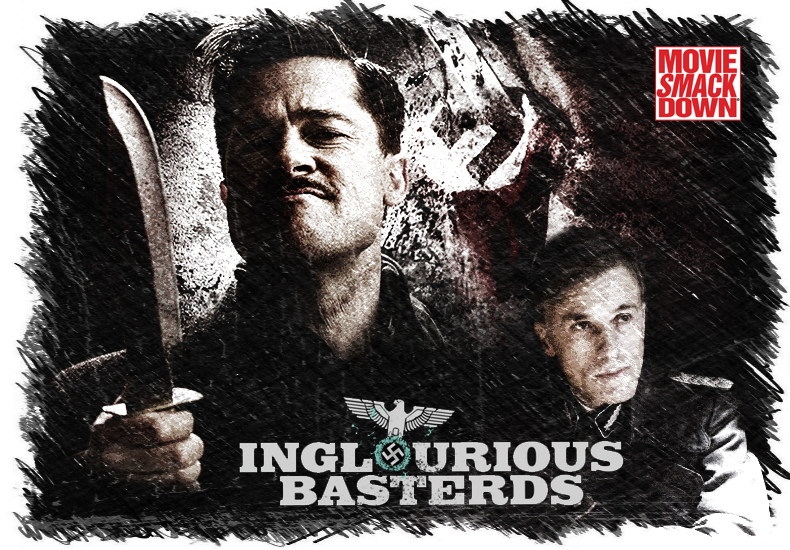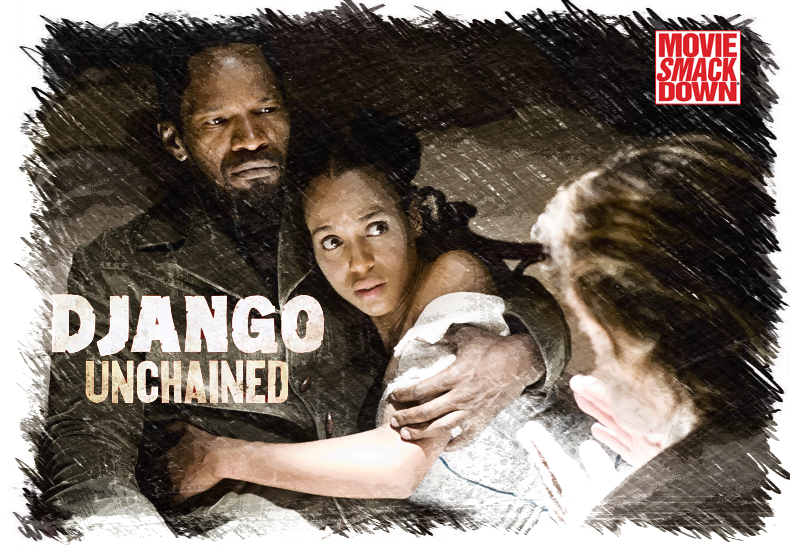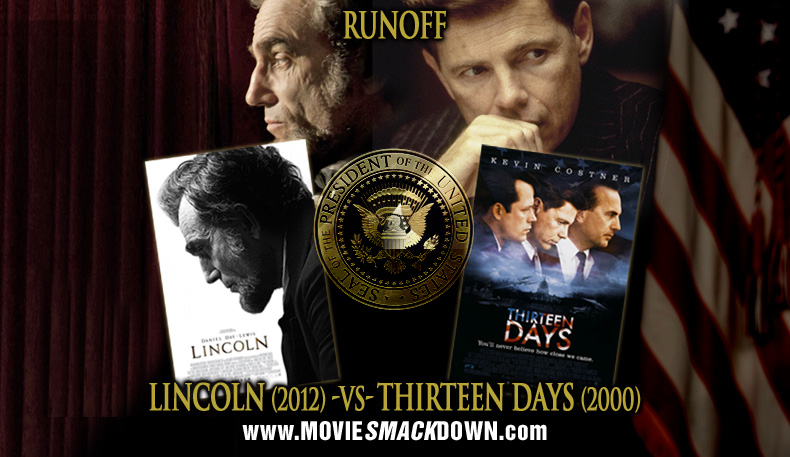
The Smackdown
Once upon a time, long before you were born, way back in 1994, a writer-director named Quentin Tarantino made a movie called Pulp Fiction. It was a low-budget, stylish and irreverent thriller so wildly entertaining, energetic and fresh that it became an instant cult classic, was a huge critical and box office success, won Quentin an Oscar for his script (story co-written with Roger Avary), and turned him practically overnight into the biggest celebrity director since Alfred Hitchcock.
The movie was so unconventional in so many ways — unusual length (two hours and forty minutes), non-chronological/episodic/multi-plot structure, long stretches of idle chit-chat, hairpin plot turns, extreme violence sprinkled with laughs, eccentric soundtrack selections — and Tarantino was so amply lauded and rewarded for it that he began to believe he could do no wrong, that he could be either as daring or as lazy as he felt on any given day, and we would continue to bow at his feet. The films that followed over the next two decades were… well, it depends who you ask. There are those who still worshipped at his altar, but many others didn’t quite take to much of it, grew tired of waiting for the old Tarantino to return, and viewed each new release with ever-decreasing expectations.
Which brings us to his latest effort, the blood-drenched, race-themed Western, Django Unchained. On the surface, it would seem Tarantino may be carving a new niche for himself, reinterpreting historical events with his own gonzo spin. Critics responded well to his most recent film, the revenge-on-the-Nazis, movie-geek fantasy Inglourious Basterds, which took that route and won some awards for it in 2009. Let’s stick Django in the ring with it and see what happens. Cue up Stealers Wheel’s “Stuck in the Middle with You,†and here we go…
The Challenger
It’s 1857, which, as a screen graphic reminds us, is three years before the Civil War. Django (a cool, subdued Jamie Foxx) is a slave who is purchased in mid-transport by Schultz, an exuberant German bounty hunter (Christoph Waltz), who needs his help identifying his current quarry. The two form an instant friendship and partnership, with Django proving a natural fit for the job (“Kill white folks and get paid for it? What’s not to like?â€).
Django also has a long-term goal — tracking down his wife Broomhilda (lovely Kerry Washington), a slave who, much to Schultz’s fascination, had learned to speak German from her mistress. The trail leads them to cheerfully malevolent Calvin Candie (Leonardo DiCaprio, having a blast), whom they gain audience with by pretending to be traders of Mandingo-fighters, but their true motives don’t escape the suspicions of Candie’s fiercely loyal right-hand servant, Steven (Samuel L. Jackson, scary-funny as always).
 The Defending Champion
The Defending Champion
We’re in Nazi-occupied France, toward the end of the war. Square-jawed, Southern-accented Lt. Aldo Raine (Brad Pitt) and his ruthless eight-man troop of Inglourious Basterds (featuring B.J. Novak from The Office and schlock horror director Eli Roth as a baseball bat-wielding “Bear Jewâ€) are wreaking havoc on the Third Reich, not only killing but scalping every Nazi they can get their hands on, per Raine’s orders.
Meanwhile, a lovely blonde (Melanie Laurent) who runs a local art-house cinema is being clumsily wooed by Nazi soldier Fredrick Zoller (Daniel Bruhl), who has recently starred in a Goebbels-produced propaganda film about his own sniper feats. He manages to arrange for her theater to host a glamorous premiere of the film for all the top Nazi brass, unaware that the theater-owner is actually Shosanna (pronounced Shoshanna, but spelled, uh, unconventionally, like half the other character names and both words in the film’s title) Dreyfus, a Jewish woman who had narrowly escaped destruction years earlier. Her family had been discovered hiding under a farmhouse in the film’s breathtaking opening sequence by multi-lingual Col. Hans Landa (Waltz again, in a star-making, Oscar-winning performance), a sort of Nazi Sherlock Holmes who is put in charge of security for the premiere.
Meanwhile, British soldier and German film expert Lt. Archie Hicox (an early, charming role for Michael Fassbender) is recruited by his superior (Mike Myers) (!) to infiltrate the premiere with the help of glamorous film actress Bridget von Hammersmark (Diane Kruger) and an assist from Pitt’s team. But Dreyfus has vengeful plans of her own for her captive audience, which includes no less than Hitler himself. It all culminates in an explosive set-piece that, uh… let’s just say deviates from the history books a wee bit.
The Scorecard
Count me among those who had long ago written off Tarantino as at most a three-hit wonder (in addition to Pulp Fiction, I remain quite fond of Reservoir Dogs and his script for True Romance). For me, Basterds did nothing to change that. Mainly, I found it unforgivably pokey and self-indulgent; like most of Tarantino’s later work, it’s in love with the sound of its own dialogue, and unlike the early stuff, not justifiably so. The result is a lot of long, long conversation scenes, some of which predictably lead to abrupt bursts of violence, and others that don’t lead anywhere. Moreover, there is Tarantino’s rather questionable, arguably offensive choice of rewriting world history, changing a profoundly haunting and tragic chapter into a comic book revenge fantasy. Personally, I wouldn’t say I find it offensive so much as extremely shallow, jingoistic and juvenile, akin to writing a 9/11 movie in which we track down and blow up all of al-Qaeda on 9/12.
At first take, Django Unchained sounded a lot like Tarantino’s attempt to do for the Western and blaxploitation genres (two of his favorites) whatever the hell Basterds attempted to do for WWII. And yes, there are many surface similarities: At 165 minutes, Django is even longer than IB‘s already epic-length 153. It too has scenes of static conversation that go on much longer than they have any right to or any other filmmaker would let them. It too has the great Christoph Waltz prominently featured and speaking several languages, albeit this time playing a character almost as instantly lovable as his Col. Landa was instantly detestable. It too, like all of Tarantino’s work, is crammed with sly references to other films, by way of homage shots, character names (starting with the title role, which refers to a beloved 1960’s spaghetti Western franchise starring Franco Nero), and odd cameos (starting with Nero himself, as well as the likes of Bruce Dern, Jonah Hill, Tom Wopat (Luke Duke?!), Ted Neeley, Michael Parks, and a well-fed-looking Tarantino, attempting an awful Ozzie accent). It too makes some goofy, deliberately anachronistic soundtrack choices, featuring everything from hip-hop to Jim Croce. And it too co-opts a horrible, shameful chapter from the pages of history for the purposes of blood-spattering, revenge-soaked, shoot-’em-up fun.
But here’s the difference: It is fun. Hella fun, as the kids say.
What goes right this time? Mainly that Tarantino has rediscovered his talent as a storyteller and not just an assembler of kick-ass, geekgasm-inducing set-pieces. Gone is much of the cheesy, self-conscious gimmickry of Inglourious, with its chapter title cards and character-identifying graphics (complete with arrows) and a narrator briefly interrupting to explain the flammability of nitrate film. And gone, too, is the sheer sluggishness of the last few films; one sequence in Inglourious in which Shosanna is picked up, brought to a restaurant, asked to host the premiere and interviewed by Landa over a plate of strudel takes a whopping 13 minutes of screen time that feels twice as long.
Not that anyone would ever accuse Django of being whippet-paced, but because there’s a simple, understandable goal at stake for these utterly likable protagonists (the pairing of the giddy, garrulous Waltz and the taciturn Foxx is truly inspired), and because the villains are so colorful and off-the-wall (the DiCaprio/Jackson pairing is equally odd and delightful), we’re never bored. We’re halfway through Inglourious before we even know what it’s building toward, but Django finds its narrative groove early on and never strays from it.
Django is also simply a better constructed, more satisfying tale; the heroes of Inglourious succeed mainly because the villain, at the moment he’s holding all the cards against them, offers them an extremely generous deal, completely out of the blue. Django, like a true Eastwoodesque hero, gets no help from anyone. Not even the chair. (Cue Neil Diamond…)
The Decision
Revisiting it on video, I remain unmoved (and at times thoroughly bored) by Inglourious Basterds, save for Waltz, who makes for the most delightfully urbane and articulate villain of recent years and deserved all the awards he raked in for it. I find it a slow, shallow and ultimately rather insensitive mess, albeit an improvement over the soulless chop-socky anthology Kill Bill and the dreadful Death-Proof. So it delights and surprises me no end to report to the QT fans and detractors and everyone in between, that Django Unchained is shockingly good fun. It delivers the laughs, the jolts, the memorable performances and kinetic thrills that Pulp Fiction proved him capable of. It’s not quite in that movie’s league, but it ranks among the year’s most entertaining and satisfying films and, needless to say, scores an easy Smackdown victory.







I found this article quite useful, since I didn’t like IB and didn’t know if I would like Django. Most reviews for Django were from people telling how great it was, like IB, but IB wasn’t that great to me.
I don’t know why I even look at this website anymore, almost all of the evaluations and comparisons are poorly written and done on purely a level of personal entertainment rather then actually comparing by means of aesthetic value.
If film reviews through the ages have taught any lesson, Michael, it seems it’s that people firmly hold their own opinions and think people who don’t share them are wrong. Or can’t write. Or are looking at the film through the wrong filter, etc.
Art’s a very strong writer, though, we’re lucky to have him.
We also like having you around. Please consider posting longer comments that put your POV out there as strongly as you want. We like to hear it.
Michael, it’s true that this is not an “aesthetic value” type of review site. We’re not “The New Yorker”. Do you really expect a site named “Movie Smackdown” to be? We have a certain amount of space to review and compare/contrast two movies as best we can, and choose one as the “winner” of this faux fight. Me, I think it’s a clever idea that sets it apart from being just one more of the ten billion other movie review sites on the web, and in that spirit, it’s good, clean fun, well-run by Bryce, well-edited by Eric, well-written by my colleagues, and well-designed by people too numerous to mention.
If what you’re seeking is more penetrating, analytical, “artistic” critiques, try Slant Magazine, they have some excellent critics of that ilk over there. But we’re NOT that, never have been, and don’t claim to be, so to come on here and complain that this website isn’t something that never had any intention of being is just kind of odd and pointless, and I don’t really see the percentage in it.
Slow day?
Hear, hear!
That states our mission about as clearly as I’ve seen it stated. Yeah!
Terrific analysis, Artie. I only have one quibble with your hypothesis.
Were Tarrentino to make a 9/11 movie, he’d have Al Queda wiped out before the second tower was down.
This is good news. I also disliked Inglorious; Kill Bill was just okay. I prefer Reservoir Dogs over Pulp Fiction but they are both brilliant. For me, what matters most is the exceptionally high quality dialogue which distinguished this earlier work. Without the great dialogue, Tarantino has very little left except shocking violence.
I agree, John. The dialogue is decent in this one, but it’s really not the draw; there’s nothing particularly comparable to the old days. DiCaprio delivers an off-the-wall speech about phrenology at one point, but it’s just nowhere near the league of, say, Hopper’s monologue in “True Romance.”
I am more charitably disposed to Inglourious than you are, but your rating Django so much higher tells me one thing: I know where I’ll be shaking off my eggnog coma.